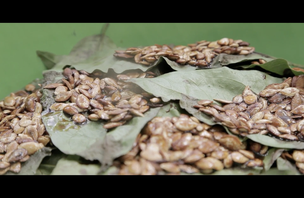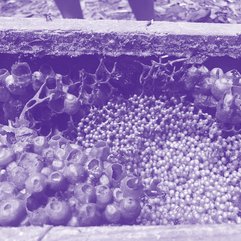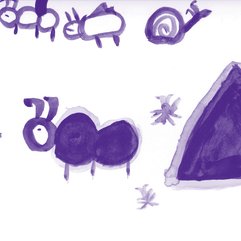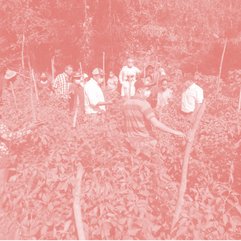Closing Weekend
Two days of activations marking the closure of the outgoing exhibitions KUXAÁN SÚUM, U JUUM BÁALAM KAAB, and XOOK K’IIN.
14.00-18.00
14.00-20.00
Save the Date
all ages welcome
in German/in English

Intergenerational guided tour
Saturday 17.02.2024 — 2:00 p.m.
Through our exhibition spaces, we will experience the works through touching, seeing, smelling, and participating in a playful way to learn together about KUXAÁN SÚUM, U JUUM BÁALAM KAAB, and XOOK K'IIN.
Guided tour with Antonia Alampi
Saturday 17.02.2024 — 5:00 p.m.
For the closure of the exhibitions Artistic Director Antonia Alampi will give a tour, sharing what lies behind the processes of these collaborative endeavors.
Presenting Spore’s Cultural Tools, Lotta Schäfer, Mariela Nagle and Magdalena Wiener
(in German and English)
Sunday, February 18th — 2:00 p.m.
A presentation of cultural and educational tools that were developed by Spore and our partners, in Berlin and in the Global South, as part of the long engagement with the themes of bio indicators (XOOK K’IIN) and caring for the native Melipona bee (U JUUM BÁALAM KAAB) that in turn informed our outgoing exhibitions.
Diverse instead of silent landscapes
A conversation about the fight against pesticides, chemical colonialism, and agroecological alternatives
Sunday, February 18th — 4:00 p.m.
(in German)
A panel discussion with Julia Bar-Tal (Geschäftsführerin Arbeitsgemeinschaft bäuerliche Landwirtschaft Nordost), Dr. Christian Schliemann-Radbruch (ECCHR - European Center for Constitutional and Human Rights e.V.), Matthias Wolfschmidt (Aurelia Stiftung) and Ximena Ramos Pedrueza Ceballos (Lawyer for environmental law, México)
Monocultures and the widespread use of pesticides are literally silencing landscapes. The number of wild plants, pollinating insects, birds and soil organisms is rapidly declining. Agricultural poisons endanger the health of soil, water, consumers, farmers and agricultural workers. Despite widespread protests, the European Union recently extended the approval of the controversial pesticide glyphosate for another ten years. It is one of the most widely used pesticides in the world and has been marketed by Monsanto (now Bayer) under the name Roundup since the 1970s. The Aurelia Foundation, which campaigns for the protection of honey bees and the 565 known species of wild bees in this country, has filed an appeal against this decision.
Although other pesticides classified as highly toxic have long been banned in Europe, chemical companies such as Bayer, BASF and Syngenta continue to export them profitably to countries in the Global South. This form of environmental racism takes place against the backdrop of alternatives that have long existed, such as organic farming, agroecology and traditional forms of agriculture. What legal and political instruments are available in the fight against the use of pesticides? What perspectives do farmers need in order to practice agriculture that does not use poisons and promotes biodiversity in the fields?
¿Qué les pasó a las abejas?
(What happened to the bees?)
Film screening with the director Adriana Otero Puerto.
Sunday, February 18th — 6:00 p.m.
Director: Adriana Otero and Robin Canul, Mexico, 2019
67 min, Spanish and Mayan with English subtitles
After millions of bees suddenly die in the Mexican state of Campeche, Leydi Pech and Gustavo Huchín decide to find the cause. Her path leads her to the Mexican authorities and the transnational company Monsanto. By sowing transgenic soy in their area, they are not only endangering the bees, but also our existence.
Followed by Q&A.
Xunaan Kaab
Festival for the Melipona Bee in Maní, Yucatán, 23 of October 2023
Dir. Adriana Otero Puerto, 16.50 min, Spanish.
Screening (Loop) during the Closing Weekend in the exhibition.
 Xunaan Kaab Festival
Xunaan Kaab Festival Xunaan Kaab Festival
Xunaan Kaab Festival Xunaan Kaab Festival
Xunaan Kaab FestivalThe short documentary film by Adriana Otero Puerto gives an impression of the Xunaan Kaab festival, which has been held in honor of the Melipona bee for seven years now. It was founded by the U Yits Ka'an school in Maní, Yucatán, and is based on written testimonies and traditions that speak about similar festivals and rituals from pre-colonial times. Thanksgiving rituals, various dishes and drinks prepared with Melipona honey or pollen, as well as dance and music celebrate the Melipona bees and their importance for the local culture and biodiversity. Families, children and Melipona beekeepers from different regions of Mexico come to the festival to share their experiences and to bring the Melipona bee also closer to new generations. This year's festival also included the inauguration of the Casa de Semejanzas, a sculpture by Mexican artist Ariel Guzik, which was previously on display at the Spore Initiative and has now found its new home among the other beehives of beekeeper Doña Nebi in Maní.









